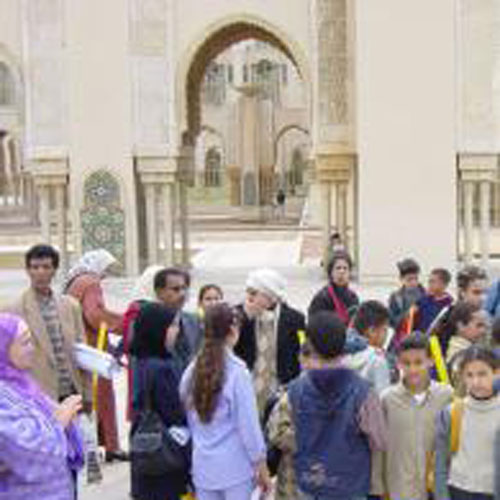
About the Project
This project is one of the 2011 WISE Awards winners.
School-Business Partnerships offers businesses the possibility of getting involved with schools at very different levels in order to support the educational system where help is most needed. Private companies can get involved financially by “adopting” a school and thus improving the infrastructure, management and access to educational material. They can also get involved in kind, by offering their expertise in terms of skills and entrepreneurial know-how, narrowing the gap that exists between the education system and the world of work.
The school adoption scheme aims to use the expertise and tools of the business sector to improve the management and education in schools. In each adopted school, a School Support Committee is established, involving a business leader, administrators, teachers, students, and parents as partners in improving the school. As a result of involving this diversity of members, school conditions are improved with better facilities and equipment, the installation of computer labs and the renovation of play spaces and buildings, and extra-curricular activities are designed and implemented.
The second aspect of the project, led by INJAZ Al-Maghrib, is to reveal to young people their potential and empower them to own their economic success. This is achieved through the deployment of pedagogical programs aimed at promoting entrepreneurship within schools and universities. Students receive training from executives on entrepreneurship, financial literacy and life skills in partnership with Injaz, a member of Junior Achievement Worldwide. Thousands of students from public middle schools, high schools and universities have been trained in entrepreneurship, financial literacy and work readiness.
Context and Issue
In addition to the financial limitations that many education systems around the world have to face – and which often have an impact on the infrastructure itself and the quality of learning – students from the public school system in Morocco often leave school without knowing what to do for a living because they have not developed soft skills and job-oriented skills enabling them to obtain relevant jobs reflecting their own wishes, tastes, and abilities.
The unemployment rate among young people in Morocco is a staggering 30 percent. Job creation is not keeping up with the growing number of young people entering the workforce every year. On the other hand, the private sector in Morocco suffers from a lack of the quality human resources necessary to improve its competitiveness. As such, the labor supply does not meet the private sector’s needs.
School-Business Partnerships tries to address these issues by providing students with the necessary skills to enter the workforce by creating their own businesses or empowering them with soft skills to help them pass their job interviews. More generally, the project aims to contribute towards reducing the youth unemployment rate in Morocco and fostering a new generation of entrepreneurs.
The Moroccan public education system does not encourage students to take the initiative. Though nearly all graduates hope to be employed, they rarely seize the opportunity to establish their own businesses, even on a small scale, despite the incentives offered by the government in terms of mentoring and loans.
Solution and Impact
The underlying principle behind the model is based on using the resources that the private sector can provide at all levels to improve the educational system.
In terms of educational outcomes and skills development, the main objective is to help young people develop their entrepreneurial spirit and soft skills, fostering a new generation of entrepreneurs. The purpose of this is to reduce the youth unemployment rate and tackle the problems of social exclusion and poverty. Thanks to different programs, students are led to create their own businesses and are prepared to face the challenges of the job market.
The strengths of the project model include:
- The innovative approach of “learning by doing”. Unfortunately, the Moroccan educational system is often based on memorization and does not encourage initiative, imagination, teamwork and the entrepreneurial spirit.
- Close collaboration with the private sector in the educational field to deliver lessons on a weekly basis.
- A new financial program, Stock in Action, in partnership with Casablanca Stock. It has also created the Smart Start program which helps students create their own company in partnership with the largest investment bank in Morocco.
- A collaboration with the Peace Corps that has implemented its programs in eight rural areas.
The training prepares students to create their own businesses, identify their future career paths, prepare for the world of work and connect what they learn in classroom to real life. In addition to this, the project makes students realize the importance of staying in school and strengthens problem-solving, decision-making, critical thinking, and interpersonal communication skills.
Future Developments
The Boston Consulting Group has provided INJAZ with a pro bono review of its strategy and organization. In accordance with its guidelines, INJAZ is planning to implement its activities in the 10 remaining main cities in the five coming years.
INJAZ is now extending its network with the support of partners such as Drosos Foundation which works alongside it in Marrakech and Agadir. The Ministry of Education will provide a coordinator in every Moroccan region to facilitate the implementation of the programs nationally. Moreover, Moroccan universities have introduced a module called Entrepreneurship and called upon INJAZ to deliver it.